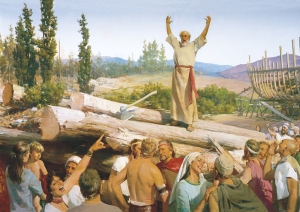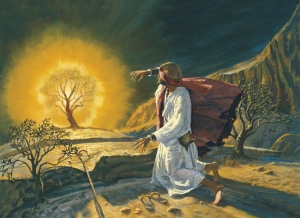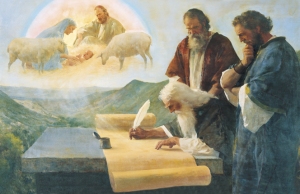To build up a good relation with the Divine Creator, the Divine Master Maker Himself provided several people who should be an example for mankind to come closer to God.

Because of the rebellion against their Maker, the first human beings where cast out of the Garden of Eden, but had their offspring also with the blemish of the consequences of their going wrong. From those two people, Adam and Eve, came forth several people and several nations. They were the beginning of all nations and therefore those the Bible refers to as “one flesh”, Eve coming from the same flesh (Adam’s) and being joined together again in marital/sexual union are really inseparable. They were told to multiply in such a way that the whole world would be populated. That is part of the Plan of God.
Their act of defiance, called “The Fall” by many theologians, is a real bummer because from it comes painful childbirth, weeds in our gardens, many problems, lots of pain and, ultimately, death. Moreover, Adam and Eve’s disobedience introduce fear and alienation into humankind’s formerly perfect relationships with God and one another. As evidence of this alienation, Adam and Eve’s son, Cain, murders his brother, Abel.

After that horrible drama it still not went right and even went so bad that God found it more than enough, and therefore would give man a possibility to return to the right path. But they did not; and therefore God brought a great flood over the whole earth.
Noah and his family where chosen to survive the deluge because Noah was
“the most righteous in his generation.”
and as such should be one of the many good examples to follow. Can you imagine what a faith in that God he could not see, he must have had, to build a giant three-decked wooden box in which he, his family, and a whole bunch of animals would have to come to live when there was going to be a massive flood that God was going to send to destroy humankind for its disobedience. For years he worked on that ark in the desert where so many passed and laughed with him, finding him a big idiot.
From the family of Noah the world of man could start again from anew. Once again God could see people not willing to follow Him but preferring to make themselves other gods and believing in them more.

In those early times of mankind, early 2nd millennium bce, we can find again a man with incredible faith in his God. Though not perfect, Avram, how he was called first, was called by God to leave his homeland in Mesopotamia to venture to an unknown Promised Land Canaan. The tales of Abraham and his wife Sarah are a roller coaster of dramatic events that repeatedly jeopardize God’s promise. The couple its faith was really tested many times. Ironically, the biggest threat to God’s promise was when God Himself commanded Abraham to sacrifice his son Isaac. Abraham did not hesitate to do what God asked from him, but right before Abraham was going to deliver the fatal blow to his own child, God stopped the sacrifice. As a reward for Abraham’s faith, God fulfils His promise to make Abraham’s descendants a great nation, as Isaac’s son Jacob eventually has 12 sons, whose descendants become the nation of Israel.
In Judaism the promised offspring is understood to be the Jewish people descended from Abraham’s son, Isaac, born of his wife Sarah. Similarly, in Christianity the genealogy of Jesus is traced to Isaac, and Abraham’s near-sacrifice of Isaac is seen as a foreshadowing of Jesus’ sacrifice on the cross. In Islam it is Ishmael, Abraham’s firstborn son, born of Hagar, who is viewed as the fulfillment of God’s promise, and the Prophet Muhammad is his descendant. {Abraham Hebrew patriarch; André Parrot, Encyclopaedia Britannica}

To bring over His messages Jehovah God uses human people who live according His wishes. One of them could see how people where not nicely treated and had to be brought out of the yoke of Egyptian slavery. Raised in the royal palace by Pharaoh’s daughter and her servant, the real mother of Moses, he had to flee Egypt for killing an Egyptian who was beating an Israelite slave. God knowing the heart of man, also knew very well what went on in Moses head and why that murder happened. Though no man can see God and live, Jehovah ‘appeared’ before Moses in a burning bush and told him to return to Egypt to deliver the Israelites from their slavery. Lots of faith in God was demanded from Moses, to meet every time the pharaoh bringing over the message of God, Who would bring a plague to the country. With God’s help, Moses succeeded in his mission, bringing the Israelites to Mount Sinai, where God gave him the Law, including the Ten Commandments.
Moses wrote down also the Words of God on the scrolls or manuscripts which we know today as the Pentateuch or the Torah. It are those books which bring us the history of man, but also bring us a picture how we can build up a good relation with God or how we can destroy such a relation.
 That God not only wants to have a relation with us when we are totally good, we can see in many other characters, who also did not have a faultless life. In David, for example, we may find a character who perpetrates one of the Bible’s most heinous crimes: he committed adultery with a woman named Bathsheba, who was the wife of one of David’s most loyal soldiers, Uriah. Though to cover up the crime, David had the Hittite killed. It was after the prophet Samuel confronted David with his sin, that he came to repent. We may see that God is a forgiving One when people repent, but we should know that sometimes we shall have to bear the punishment like it was for David.
That God not only wants to have a relation with us when we are totally good, we can see in many other characters, who also did not have a faultless life. In David, for example, we may find a character who perpetrates one of the Bible’s most heinous crimes: he committed adultery with a woman named Bathsheba, who was the wife of one of David’s most loyal soldiers, Uriah. Though to cover up the crime, David had the Hittite killed. It was after the prophet Samuel confronted David with his sin, that he came to repent. We may see that God is a forgiving One when people repent, but we should know that sometimes we shall have to bear the punishment like it was for David.
Beyond David’s royal exploits (and indiscretions), he’s credited with writing many of ancient Israel’s worship songs, which you can read in the Book of Psalms.
He was is Israel’s second and greatest king and it is out of his lineage an other prophet and king would be born and would bring salvation to the world.
Several other prophets warned people about their lifestyle and how they had to prepare for great days to come. Because many people liked worshipping multiple gods many prophets tried to have them to worship Only One True God.
In order to prove to the Israelites that the Elohim Hashem Jehovah God is the Only True God, the prophet Elijah gathered the prophets of Baal at Mount Carmel, where for the main event each deity was given a pile of wood with a bull on it. The god who could produce fire and consume the sacrifice would be called the greatest and win. Baal went first, and for half the day his prophets danced, shouted, sang, and even cut themselves in order to convince their god to answer Elijah’s challenge. When their efforts failed, Elijah prayed to Jehovah God, who immediately brought fire down from the sky to consume the sacrifice. The Israelites rededicated themselves to This Incredible God who listens to people and gives answers to people, and they killed the prophets who deceived them into worshipping Baal.

A later figure of importance is the man who with many of his prophecies inspired hope for eventual peace and righteousness on earth. Several of these prophecies were later understood by Christians to be predictions of Jesus, including the birth of Immanuel; the coming of the Prince of Peace, as quoted in Handel’s Messiah; and the suffering of God’s “Servant” for the sins of his people.
That prophet (Isaiah) spoke about a servant and sent one from God, the son of man, coming from the lineage or seed of king David, who can be considered as the most important prophet. It was the Nazarene Jew Jeshua, the ben haElohim or son of God, better known today as Jesus Christ.
He is the one who told many stories and parables so that people could come to know how to live and how to prepare themselves for the Great Day of Judgement that is going to come.
He is also the best example to follow, him being the way to God and the one showing and opening the door to the Kingdom of God.
All the above mentioned characters are only a few of the many presented in the Bible. In that Book of books we may find many men and women who can be brought forward as people of God, having done things we can learn from. Many of them were obedient to God’s commands throughout their life, some even risking their life, like Esther. Other’s their family story, like Hosea‘s, was a metaphor for God’s relationship with Israel.
In stories like the one of Jonah we can see how much better it is to listen to God. And that listening can be done by reading the most precious Book of books, the Bible.
With over 66 books of Scripture, 39 in the Old Testament and 27 in the New Testament, covering thousands of years of history, the Bible makes mention of hundreds of people either in great detail and gives others just a passing mention. From all those spoken off we can learn, the same as we can learn by looking around us and by comparing what is written, in the Bible, about such occasions we encounter in our daily life.
+
Preceding
When there is a relationship with God there is a possibility to grow
How do people want to grow and come closer to the Real God
++
Additional reading
- The real God
- Creation of the earth and man #1 Planet for living beings in a pre-Adamic world
- The 1st Adam in the Hebrew Scriptures #4 The Fall
- No man is capable of self-improvement on his own
- Disobedient man and God’s promises
- Old language to confirm the promises
- A voice and a Word given for wisdom
- Necessity of a revelation of creation 5 Getting understanding by Word of God 3
- Necessity of a revelation of creation 6 Getting understanding by Word of God 4
- Jehovah God Maker of the entire universe served by a well-trained army
- Men who believed and had faith in a Higher Power they could not see
- Today’s thought “As wax melts before the fire” (February 5)
- Today’s thought “The Land promised and fear of man” (April 18)
- Today’s Thought “The whole earth is full of his glory” (May 16)
- Today’s Thought “The earth shall be full of …” (May 21)
- Today’s thought “Being made prosperous and numerous on conditions” (May 13)
- When believing in God’s existence and His son, possessing a divine legislation
- On the Edge of Believing
- The Exodus Story: History or Myth?
- Bamidbar (In the Wilderness)
- Adar 6, Matan Torah remembering the giving of Torah
- Looking at the time when the Torah was given
- The Abrahamic Covenant and Seed of Abraham
- Keturah concubine of patriarch Abraham
- Ishmael not merely “laughing” but “Issac-ing”
- The Son can do nothing of his own accord
- Redemption #7 Christ alive in the faithful
- Souls and Religions with Nirvana and light
- Memorizing wonderfully 2 Biblical Reasons to Memorize Scripture
- A Living Faith #1 Substance of things hoped for
- When having taken a new direction in life, having become a Christian
+++





























![epic singer [Credit: Courtesy of John Miles Foley]](https://i0.wp.com/media-2.web.britannica.com/eb-media/05/319x450x138805-004-DE97092E.jpg.pagespeed.ic.bPcU3-OVC2.jpg)
















